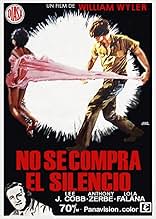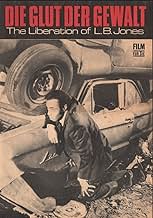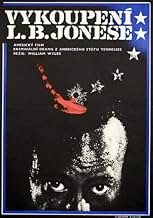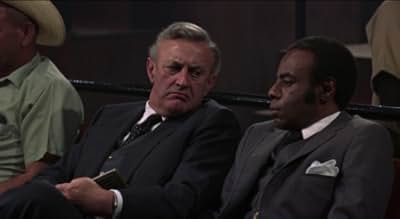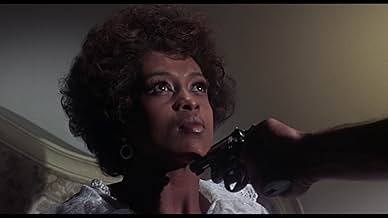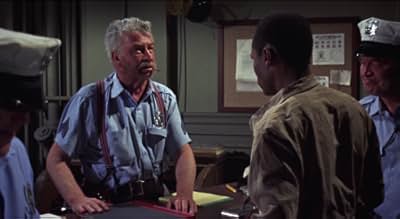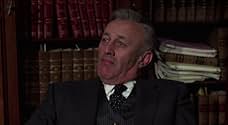NOTE IMDb
6,8/10
1,3 k
MA NOTE
Un avocat sudiste révèle la vérité sur un croque-mort assassiné.Un avocat sudiste révèle la vérité sur un croque-mort assassiné.Un avocat sudiste révèle la vérité sur un croque-mort assassiné.
- Réalisation
- Scénario
- Casting principal
- Récompenses
- 1 nomination au total
Joseph Attles
- Henry
- (as Joe Attles)
Avis à la une
I've read the book liberties & omissions were taken, overall this movie is a true gem no sugar coating here I recommend you watch it & read the book you'll come full circle I guarantee it. I would also add a remake of this wouldn't hurt just too put more flesh on the characters & script it.
This is a sad film about personal weaknesses. The storyline has several weak points too, but on the whole I should think the movie does a great director like William Wyler justice and is still watchable today. There is a certain similarity with the Oscar winning In the Heat of the Night. The screenplay is by the same author, Stirling Silliphant.
The Liberation of L. B. Jones really belongs to the African American cast, the whites' performances do pale in comparison. Roscoe Lee Browne plays the well-to-do undertaker who is cheated by his wife with a white policeman. He gives his character a quiet dignity that lasts throughout the story, up to the bitter and sad end. Yaphet Kotto's portrayal of an angry young man who comes to town with a score to settle is equally intense and convincing. Both Browne and Kotto have a few very good scenes in which they act by themselves. They both seize the chance to give their characters real depth. Lola Falana is convincing as the amoral undertaker's wife and there is a good supporting cast. I fondly remember a small, well acted scene at the beginning with an elderly lady who regularly visits the undertaker's show room to have a look at the coffin for which she pays instalments.
The white population is, it seems to me, much more stereotypical. The only really interesting figure here is the town's most important lawyer, played somewhat stiffly by Lee J. Cobb. He is a racist against his better judgment. His unlawful actions to protect white criminals seem like a reflex, not coming from the brain but rather from the spinal cord.
The Liberation of L. B. Jones really belongs to the African American cast, the whites' performances do pale in comparison. Roscoe Lee Browne plays the well-to-do undertaker who is cheated by his wife with a white policeman. He gives his character a quiet dignity that lasts throughout the story, up to the bitter and sad end. Yaphet Kotto's portrayal of an angry young man who comes to town with a score to settle is equally intense and convincing. Both Browne and Kotto have a few very good scenes in which they act by themselves. They both seize the chance to give their characters real depth. Lola Falana is convincing as the amoral undertaker's wife and there is a good supporting cast. I fondly remember a small, well acted scene at the beginning with an elderly lady who regularly visits the undertaker's show room to have a look at the coffin for which she pays instalments.
The white population is, it seems to me, much more stereotypical. The only really interesting figure here is the town's most important lawyer, played somewhat stiffly by Lee J. Cobb. He is a racist against his better judgment. His unlawful actions to protect white criminals seem like a reflex, not coming from the brain but rather from the spinal cord.
The "novel" this is based on was according to the author, almost entirely true, only the names were changed to protect the innocent and the guilty. This underlying truth plays out strongly here. I must stop to say the plot synopsis has nothing to do with the film. This is not a mystery with a "who did it" structure and it is not a courtroom justice or injustice movie. The events play out in sequence and we jump from character to character so that it remains, every bodies story, so to speak. We aren't allowed to distance ourselves from the story by taking the look from the good lawyer or cops perspective after the fact. Yaphet Kotto among many, probably gives the best performance. The photography and the score both seem a bit dated, though each have their strong moments, otherwise this doesn't date at all. The characters motives, good and bad, are clearly laid out and well performed. There are a few moments of technical slop, some optical blow ups of shots in the middle of dialog scenes and a couple of lazy zooms that would not have appeared in a Wyler film a few years before that, but in every other way this shows him still at the top of his game. It's a shame that he stopped making films after this. He himself considered it a strong film and he seems to have more or less expected that it would anger people (white ones that is) when it was released. His usual skill with actors is in evidence and there is some interesting use of sound to help tell the story at crucial moments. Very powerful stuff all around.
It is appropriate that the title character is an undertaker for this final film from William Wyler feels like a mass funeral for all hopes of racial reconciliation in the America of 1970, (not that it's gotten any easier now). The last shot of the two white liberals and the lone black radical sitting on opposite sides of the train as it flees the benighted region of bigotry and violence says it all. You certainly do not expect that these thee will come together once the train passes from Kentucky to Ohio! A powerful, somber image to end a powerful, somber film. Somber but not dull. Sure the proceedings can get lurid at times, even semi trashy. But I prefer this to the heavy handed, messagey treatment Hollywood has often employed when dealing with black/white conflict. (See the ouevre of Stanley Kramer and his students). Indeed, had the screenplay, by Stirling Silliphant (revisiting racial bleakness after "In The Heat Of The Night") and Jesse Hill Ford (the novelist upon whose work the film is based and himself a tragic figure), been better, with a fuller examination of the white liberals' characters and their relationship with the white patrician lawyer, wonderfully played by Lee J Cobb, then this film would have approached greatness, in my opinion. As it is let us give it a B for a solid end to one of Hollywood's most distinguished directorial runs, as well as the performances of Cobb, Anthony Zerbe and Arch Johnson, playing two of the more despicable redneck cops you'll ever see, a young and intense Yaphet Kotto and, above all, Roscoe Lee Browne as defiant, unbending LB Jones. Haven't seen enough of this fine actor's work to say whether it's his best but it has to rank fairly high, one would think.
PS...I regularly excoriate TCM on its programming choices (like devoting an entire day to the work of Arlene Dahl or repeatedly showing "Wait Until Dark" and "Alice In Movieland") but I have to congratulate whoever came up with last month's spotlight on final films from great directors. A total blast. At the very least, (as in "Ambush"), interesting and at best, (as in "Madadayo"), eye opening.
PS...I regularly excoriate TCM on its programming choices (like devoting an entire day to the work of Arlene Dahl or repeatedly showing "Wait Until Dark" and "Alice In Movieland") but I have to congratulate whoever came up with last month's spotlight on final films from great directors. A total blast. At the very least, (as in "Ambush"), interesting and at best, (as in "Madadayo"), eye opening.
Sometimes I have to scratch my head and wonder why the hell a film isn't more acclaimed and/or remembered. William Wyler's last film The Liberation of L.B. Jones (1970) is one of these. A nail biting inferno of racial hate and discomfort.
Don't read the tagline and stay away from certain posters, it might spoil it! But even though I knew part of the outcome parts of this film stopped me from breathing, and I'm still filled with this heavy indescribable feeling.
It's essentially the tale of when the people discriminated against stops being afraid. It's also an exploration of the small towns of a bygone age, and their despicable sentiments.
The Liberation of L.B. Jones would fit perfectly in the company of films in In the Heat of the Night. Perhaps it was just a tad late, or perhaps it was a bit too bleak, but this is surely a film I will remember. A wonderful way to go out for the legendary Mr. Wyler. One of the best directors who ever lived! 8.5/10
Don't read the tagline and stay away from certain posters, it might spoil it! But even though I knew part of the outcome parts of this film stopped me from breathing, and I'm still filled with this heavy indescribable feeling.
It's essentially the tale of when the people discriminated against stops being afraid. It's also an exploration of the small towns of a bygone age, and their despicable sentiments.
The Liberation of L.B. Jones would fit perfectly in the company of films in In the Heat of the Night. Perhaps it was just a tad late, or perhaps it was a bit too bleak, but this is surely a film I will remember. A wonderful way to go out for the legendary Mr. Wyler. One of the best directors who ever lived! 8.5/10
Le saviez-vous
- AnecdotesFinal film of director William Wyler.
- Citations
Emma Jones: It going be something. I can't let nobody rob my baby and I can't let my baby enter this world without a dime!
- ConnexionsFeatured in Classified X (2007)
Meilleurs choix
Connectez-vous pour évaluer et suivre la liste de favoris afin de recevoir des recommandations personnalisées
Détails
- Date de sortie
- Pays d’origine
- Langue
- Aussi connu sous le nom de
- The Liberation of L.B. Jones
- Lieux de tournage
- Humboldt, Tennessee, États-Unis(location shooting - used for Somerton, Tenn.)
- Société de production
- Voir plus de crédits d'entreprise sur IMDbPro
Box-office
- Budget
- 3 500 000 $US (estimé)
Contribuer à cette page
Suggérer une modification ou ajouter du contenu manquant

